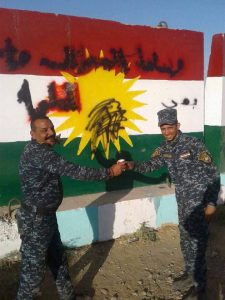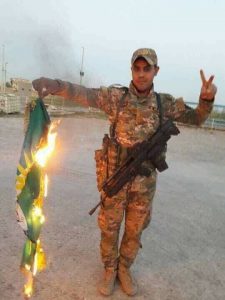Washington Kurdish Institute
October 16
Last night, Sunday October 15, 2017, the Iraqi government began a preemptive offensive attack against Peshmerga forces in Kirkuk and other disputed territories controlled by the Kurdistan Regional Government (KRG).
The attacking forces included both soldiers of the Iraqi army as well as a large number of pro-Iranian militias, who have been supported by Iran to fight ISIS in Iraq since 2014.
Iraqi federal forces fled these regions in June 10, 2014 during the initial emergence of ISIS in the region. As these forces fled, the KRG’s peshmerga fighters stepped in to fill the gap and successfully defended the area.
These disputed areas include Kirkuk Province and parts of Mosul Province. The most prominent of these disputed areas is Kirkuk City: an oil rich city that suffered various “Arabization” (i.e. official efforts to depopulate the area of Kurdish residents and replace them with Arab residents) campaigns by the Iraqi government prior to 2003.
The Iraqi constitution contains an official mechanism, Article 140, for settling and addressing the issues surrounding these past demographic changes in Kirkuk and other disputed territories. However, for years the post-Saddam Iraqi government has refused to follow its own constitution and abide by Article 140. Additionally, the Iraqi government has rarely paid the Kurdistan region its fair, legal share of the national budget.
While the recent independence referendum returned an astounding 93 percent vote in favor of Kurdistan independence, the reaction from the Iraqi central government has been harsh and unwavering. Namely, a united front between Baghdad, Tehran, and Ankara has imposed a blockade on the Kurdistan region. The two major political parties in Kurdistan, the KDP and the PUK, called for peace and talks without precondition with Baghdad but the Iraqi government insisted on the “cancellation” of the results of the Kurdistan Independence Referendum as a precondition for any peace talks.
According to reports from Kurdistan, the pro-Iranian proxy militias working with Iraqi Prime Minister Haider Abadi’s government forces include groups that have attacked and killed U.S.-led coalition troops between 2003 and 2011. Some of these forces include:
- The Badr Brigades/Badr Organization: This group is headed by Hadi Al Ameri and supported financially and militarily by the Iraqi and Iranian governments. Ameri is one of the closest Iraqi Shia leaders to Iran and he actually helped Iranian forces fight against Iraq between 1980 and 1988.
- Asa’ib Ahl Al Haq (League of the Righteous): Created by Qais Al Khazali, this militia was once an extremist faction within the Al Mahdi army. After Muqtada al-Sadr dissolved the Al Mahdi army in 2007, Khazali split with his former ally to form his own militia. The head of the Badr organization, Hadi Al Ameri assisted Khazali with the creation of this fighting force. Khazali also received support from Iran and its Lebanese proxy Hezbollah.
- Khorasan Corp: Formed in 2004 by the Iranian Shia Marja Wahid Hussein Khorasani, the Khorasan Crop is the military wing of the Islamic Vanguard party. This group receives strong support from Iraqi Shia religious leader Marja Mohammad Taqi Al Modarresi. Originally formed as a political movement known as the Islamic Vanguard Organization, in September 2013 members eventually formed a military wing called Saraya Khorasan (the Khorasan Scouts). The organization’s secretary general is Ali Mahdi Ali Abbass Al Yasseri. The militia is an eclectic mix of Iraqi citizens as well as Iranians and Lebanese fighters.
A number of these aforementioned forces are currently wearing police uniforms to blend in with Iraqi army and other official federal forces. These forces also have Iranian members accompanying them as “advisers”. It appears hypocritical for Prime Minister Abadi to call the Kurdistan region’s referendum process “unconstitutional” while at the same time forfeiting Iraq’s sovereignty to Iran. But this is nothing new as Abadi’s political power, Al Dawa, has operated as a puppet for Iran since 2003.
Before the recent fighting started between the KRG and the Iraqi central government (in league with its Iranian patrons), Peshmerga commanders repeatedly called for peace and withdrew from parts of south of Kirkuk as a sign of good will. Yet once Iraqi and pro-Iranian Shia militia forces moved into these areas, they began burning Kurdistan flags and defacing Kurdish and Kurdistan symbols and pictures.
Before the fighting began, U.S. Secretary of Defense James Mattis told reporters: “my forces are integrated among these forces and they are working too, to make certain we keep any potential for conflict off the table.”
Sunday night the U.S. State Department said it was “very concerned” about the conflict developing in Kirkuk.
The position of the United States in this conflict remains confused and unclear. Despite the fact that the Trump administration recently designated the IRGC as a terrorist organization and implemented economic sanctions against its members, the United States has not taken any strong measures to prevent the Iraqi-Iranian attack against the Kurdistan region.
The Iranians see an opportunity to hit U.S. soldiers as they are based about two miles away in Kirkuk. Prior to last night’s offensive, one of Abadi’s demands was for the Peshmerga to handover control of a military base, known as K1, south of Kirkuk, where several American military elements were located serving in a support role in the fight against ISIS for the past two years.
Also, the U.S., both its executive and legislative branches, continues to support Prime Minister Abadi. For example, when talking about the Kurdistan region’s independence referendum, U.S. Senate Foreign Relations Committee Chairman Bob Corker told Al-Monitor that “we felt like it would weaken [Iraqi Prime Minister Haider al-Abadi] as he runs for reelection in [2018].
Yet this thinking seems short-sighted, with no real vision beyond Abadi himself. That is, what is the U.S. plan for Iraq if Abadi should lose his seat in the 2018 elections or if he were to die of natural causes sometime in the near future? The U.S. administration should more critically evaluate Abadi’s ability to win reelection, especially in light of the fact that he received only 5,151 votes in 2014, whereas his boss, then-Prime Minister Nouri Al Maliki, received more than 720,000 votes.
If this squirmish escalates into all out-war over Kirkuk, the results will be brutal and many civilians will be caught in the middle. It is also likely that many civilians will also be targeted, even by Shia factions loyal to the pro-Iraqi cleric Grand Ayatollah Ali Sistani.
The United States’ stubborn insistence on continuing its “One-Iraq” policy has cost the Westerns super power trillions of dollars and the loss of more than 4,000 U.S. service members since 2003. Yet a unified Iraq remains an illusion and something that could only really be achieved under the heavy military arm of Iranian tyranny and intervention. It is in the United States’ critical national interests to cease these attacks by pro-Iranian military forces on the Kurdistan region and the disputed territories.
Mr. Abadi is the first Iraqi leader to use force against the Kurdistan region since the fall of the dictator Saddam Hussein. Whereas the latter preemptively attacked the people of Kurdistan under the banner of Sunni Arab nationalism and Baathism, the Abadi regime arrived as Shia sectarians promoting another brand of ideological extremism with the heavy hand of the brutal Iranian theocracy at its side, whose militias stand guilty of numerous human rights abuses.
As these Shia extremist factions have entered and taken control of the city of Kirkuk on Monday, there have been reports of beheadings of captured Peshmerga. These sectarian militias have also burned and lowered Kurdistan flags across the city — flags that were legally permitted under the Iraqi constitution which Prime Minister Abadi purports to stand behind.
The people of Kurdistan do not and will not forget the chemical weapon attacks and genocide orchestrated against them by Iraqi governments of old. And they will not forget this current act of aggression. These vile acts aren’t new but one thing is definite: if the United States does not do anything to stop these brutal attacks, there will be an endless war for Kirkuk as the Kurds will not give up defending their land, their people, and their rights against this current Iraqi regime and its Iranian proxies.



